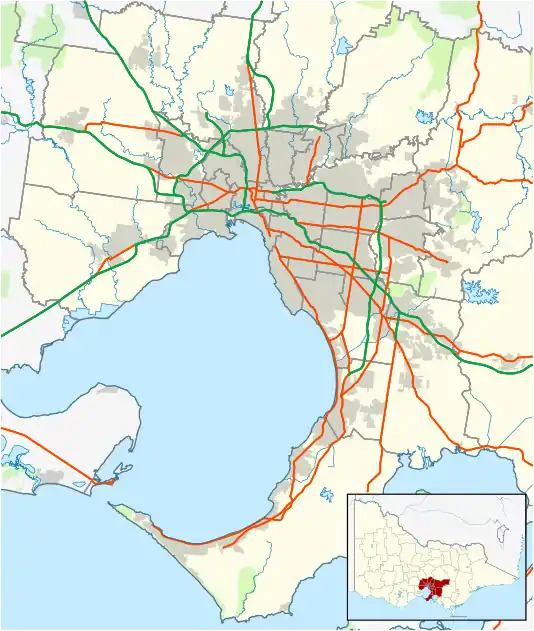Caulfield South, Victoria
Caulfield South is a suburb in Melbourne, Victoria, Australia, 10 km south-east from Melbourne's central business district. Its local government area is the City of Glen Eira. At the 2016 Census, Caulfield South had a population of 11,854.
| Caulfield South Melbourne, Victoria | |||||||||||||||
|---|---|---|---|---|---|---|---|---|---|---|---|---|---|---|---|
 Caulfield South | |||||||||||||||
| Coordinates | 37.891°S 145.026°E | ||||||||||||||
| Population | 11,854 (2016)[1] | ||||||||||||||
| • Density | 3,590/km2 (9,300/sq mi) | ||||||||||||||
| Postcode(s) | 3162 | ||||||||||||||
| Area | 3.3 km2 (1.3 sq mi) | ||||||||||||||
| Location | 10 km (6 mi) from Melbourne | ||||||||||||||
| LGA(s) | City of Glen Eira | ||||||||||||||
| State electorate(s) | Caulfield | ||||||||||||||
| Federal Division(s) | Goldstein | ||||||||||||||
| |||||||||||||||
Caulfield South is bounded by Glen Huntly Road to the north, Booran Road to the east, North Road to the south and Kooyong Road to the west. Although it has no railway station, it is serviced by tram routes 64 and 67. Elsternwick, Glenhuntly and Caulfield railway stations are all within a short drive, with both Elsternwick and Glenhuntly stations accessible via the number 67 tram.
One landmark of note is the Caulfield General Medical Centre, which began life as one of the local mansions, the Glen Eira. This was purchased in 1915 by the Australian Department of Defence and turned into No. 11 Army General Hospital where it served as a rehabilitation centre for returned servicemen from the Great War who sustained permanent or severe injuries. It has since undergone many changes of purpose and management and currently caters primarily for rehabilitation and geriatric medicine.
The Brighton Cemetery is also located in Caulfield South, and pre-dates the Caulfield Roads Board - the first official recognition of the suburb of Caulfield. Opened in 1855 it became, together with St Kilda Cemetery, an alternative resting place for those who had lived south of the Yarra River. There are up 70,000 people interred, including famous Australian artists, politicians and military heroes.
Caulfield South has many parks and gardens, the most notable of which is Princes Park. The area was a council landfill up until the middle of the twentieth century, when it was transformed into public park lands. It has been improved further and now includes several ovals and playing fields, sports clubs, pavillons, open spaces, children's playgrounds and many paved walking tracks with dog walking welcome.
Caulfield South Primary School is located in Bundeera Road.
The Rosstown Railway once ran through Caulfield South, and its traversal through several suburban blocks remains public land to this day, an easy identifier of where the track once ran.
The architecture of Caulfield South is predominately period-style detached 2 and 3 bedroom family homes with both front and rear gardens. Not all properties have off-street parking and rely on space available on the street. The architectural styles range from the early 1900s and onwards with common styles being Edwardian weather board to Californian Bungalow to Red Brick Clinker pairs which share a common wall. An increasing trend is the demolition of the original house to construct a large, two storey modern house. There are also a growing number of higher density apartments and flats appearing, especially close to the tram lines.
Native wildlife that inhabit the suburb include both ring tail and brush tail possums, magpies, crested pigeons, rainbow lorikeets and wattle birds.
Based on findings from the 2011 census and their own research, The Australian Centre for Jewish Civilisation at Monash University estimates that the suburb has 5,005 Jewish residents, comprising 44.4% of the suburb's population.[2] Results from the 2016 census indicated a Jewish population of 4,008, a percentage of 33.9.[3]
Education
The Japanese School of Melbourne (JSM), a Japanese international school, is located in Caulfield South.[4] Several Japanese families settled in the area around Caulfield due to the location of the JSM.[5] There were nine temporarily-located Japanese families in Caulfield South in 1987, and the Japanese population increased after that point due to the school.[6]
The suburb is also home to the Fink Karp Ivany campus of Mount Scopus Memorial College, a Jewish day school. 25% of Jewish children in Caufield South attend government schools and the remainder attend independent schools.[2]
See also
- City of Caulfield - the former local government area of which Caulfield South was a part.
References
- Australian Bureau of Statistics (27 June 2017). "Caulfield South (State Suburb)". 2016 Census QuickStats. Retrieved 11 February 2013.

- The Jewish population of Australia: Key findings from the 2011 census Jewish Care. Retrieved on 14 September 2016
- "2016 Census QuickStats". Australian Bureau of Statistics. Retrieved 17 November 2018.
- "Welcome to JSM!" (Archive) The Japanese School of Melbourne. Retrieved on 4 January 2014. "6 ELLINGTON STREET CAULFIELD SOUTH VIC.3162"
- Mizukami, Tetsuo. The Sojourner Community: Japanese Migration and Residency in Australia (Volume 10 of Social sciences in Asia, v. 10). BRILL, 2007. ISBN 9004154795, 9789004154797. p. 146. "In Melbourne, it is apparent that the establishment of the full-time school in Caulfield is a major 'pull-factor' for Japanese families with school-age child(ren), and some indeed chose to live in this vicinity."
- Mizukami, Tetsuo. The Sojourner Community: Japanese Migration and Residency in Australia (Volume 10 of Social sciences in Asia, v. 10). BRILL, 2007. ISBN 9004154795, 9789004154797. 119.
External links
- Glen Eira city council home page.
- Further information about Brighton Cemetery.